Two Chinese scientists, physical chemist Zhang Cunhao and nuclear weapons expert Cheng Kaijia, won China's top science award on Friday for their outstanding contribution to scientific and technological innovation.
The pair, both academics of the Chinese Academy of Sciences, were presented with certificates by Chinese President Xi Jinping at an annual ceremony held to honor distinguished scientists and research achievements. Winners are each entitled to an award of 5 million yuan (826,276 US dollars).
Addressing the ceremony, Premier Li Keqiang said, "China has entered a new stage in which the country must rely more on sci-tech innovation to guide and support its economic development and social progress."
| Profile of the two top award winners |
|
Prize-winning chemist heads science foundation Zhang Cunhao (Right in the photo), born in 1928 in Tianjin, is a renowned chemist, former president of the National Natural Science Foundation of China, member of the Chinese Academy of Sciences and a fellow of the Third World Academy of Science. Zhang graduated from the Central University in 1947, then went to study in the United States and received a master's degree in chemical engineering from the University of Michigan in 1950. [More] |
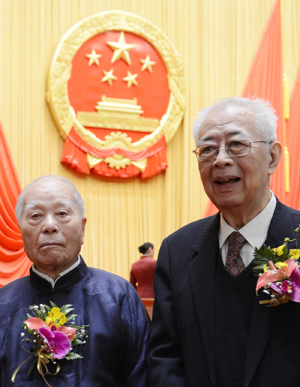 |
Founder of China's nuclear science receives award Cheng Kaijia (left in the photo), born in 1918 in Jiangsu province, is a famous physicist and founder of China's nuclear science and technology. Cheng graduated with a bachelor's in physics from Zhejiang University in 1941. In 1946, he studied at the University of Edinburgh in the United Kingdom and obtained a doctorate in 1948. He then became a researcher at the Institute of the Royal Chemistry Industry. [More] |
| Factbox |
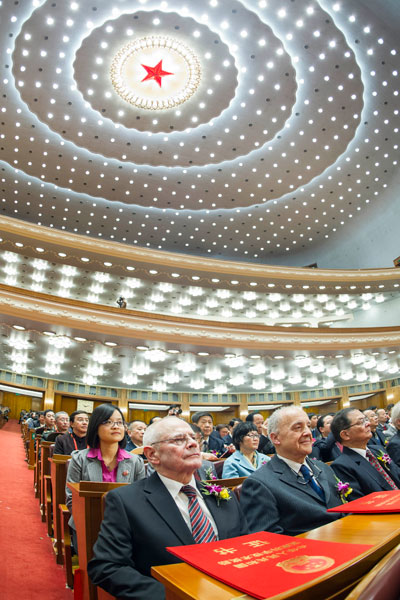 |
Five awards are given out to recognize scientists and their contributions in special scientific aspects: (1)State Pre-eminent Science and Technology Award — to honor the achievements of top scientists - no more than two winners - award granted by the President - 5 million yuan ($826,000) bonus (2)State Natural Sciences Award — to honor major breakthroughs in fundamental research - grand prize: 1 million yuan bonus - first prize: 200,000 yuan bonus - second prize: 100,000 yuan bonus (3)State Technology Invention Award — to honor new technical achievements - prize : the same with the second award (4)State Science and Technology Progress Award — to honor technologies that brings considerable economic benefits - prize : the same with the second award (5)International Science and Technology Cooperation Award — to honor foreign scientists who promoted science advancement in China -no bonus [More] |
| Foreign winners Q+A |
| Arun S. Mujumdar, of Canada, is a professor of engineering at the National University of Singapore and McGill University in Canada. He has made significant contributions to enhancing the technological advancement of China's food drying industry since 1984. |
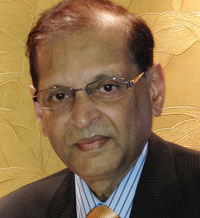 |
What has been your most important accomplishment in China? As an academic I believe my major accomplishment in China has been in generating interest in universities and industry in conducting R&D in areas of interest to China. This has led to a very large number of research publications, PhD theses as well as training of high-end talent in this field. [More] |
| Fabio Rocca, from Italy, emeritus professor of digital signal processing at the Politecnico di Milano. He has promoted China-European cooperation on earth observation since 2004. | 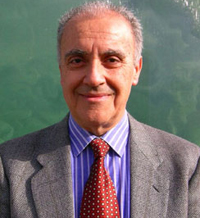 |
What do you think about the level of research carried out in China compared with other places around the world? Chinese scientists are clever, dedicated, and unselfish and their progress cannot be limited. Many started their work on radar satellites within the cooperation with the European Space Agency in 2004 but now Chinese Scientists are at the forefront in all methodologies. [More] |
| Jan Eduard Harff, German, a marine geologist of the Leibniz-Institute for Baltic Sea Research Warnemunde, currently at the University of Szczecin, Poland. He has contributed significantly in China's marine geology development | 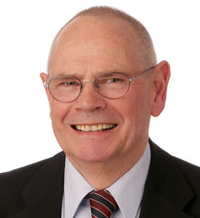 |
How do you feel about winning this award? This is for me the greatest honor I have ever received. I am personally very touched and moved because I have been working successfully together with Chinese colleagues already for 20 years. I am enjoying this cooperation not only because of the scientific results, but, also because I have met so many good friends during these years. [More] |
| Jun Ni is from the United States and is director of the University of Michigan's Shien-Ming Wu Manufacturing Research Center. He promoted cooperation between Shanghai Jiao Tong University and his college by establishing a world-class international institute. | 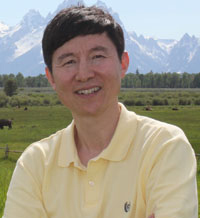 |
How has your work in China helped your career develop in your native country? For more than 10 years, I have helped to establish a collaborative partnership between the University of Michigan and Shanghai Jiao Tong University. This partnership has greatly benefited both universities in student exchanges and joint research. [More] |
| Wang Zhong Lin, regents' professor and director of the Georgia Institute of Technology's Center for Nanostructure Characterization. He helped found a number of national nanoscience research and education programs and facilities in China. | 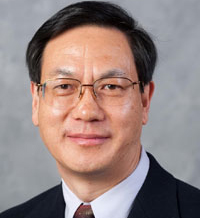 |
What were the main factors behind your winning the award? There are three main reasons that I was honored. First, I have graduated, trained and supervised more than 120 Chinese PhD students, postdoctoral fellows and visiting scientists. This is a great contribution to the training of young scientists. [More] |
| Hse Chung-yun, from the United States, chief researcher at the Southern Research Station of the US Forest Service. He has been devoted to strengthening Sino-US cooperation in forestry science and technology for more than three decades and has made major contributions in talents cultivation and introducing advanced technology. |
|
What has been your most important accomplishment in China? On a personal level, a bridge across the ocean has been built to facilitate the collaboration in forestry science and technology, which is truly mutually beneficial. [More] |
|
G.A. Zherebtsov, Russian, born in 1938, is one of the founders of space weather sciences in Russia. He has published over 240 academic papers and is a member of the Russian Academy of Sciences. |
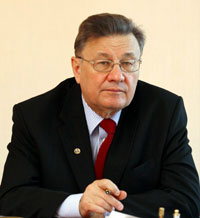 |
Zherebtsov has promoted cooperation between the Russian Academy of Sciences and the Chinese Academy of Sciences. Through his efforts, the two sides co-founded a space weather research center in 2001, helping Chinese and Russian scientists to strengthen exchanges. [More] |
| Herbert Jaeckle, German, vice-president of the Max Planck Society. He has been promoting cooperation with China since the 1980s and made a major contribution to the establishment of the CAS-MPG Partner Institute for Computational Biology. | 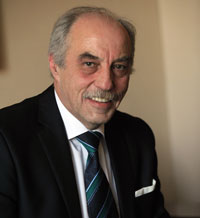 |
What plans do you have to carry out work related to China in the next five to 10 years? Our aim is to intensify the strategic cooperation with the CAS and to bring in new features. For example, it's conceivable that we might enter into trilateral cooperation with universities through the new centers that are currently being established by the CAS in conjunction with China's universities. [More] |
| Background |
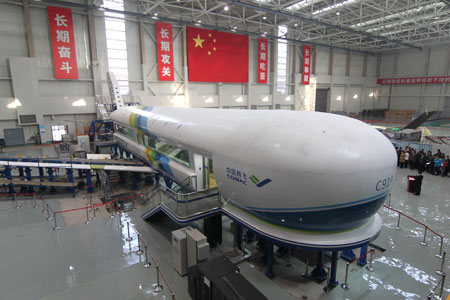 |
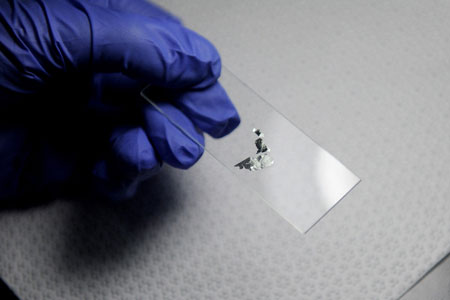 |
|
New system acts as catalyst for tech advancement As China undergoes industrial upgrading, new requirements are necessary for the development of science and technology as are assessments of scientific achievements. In 2013, the State science and technology awards, the highest honor in the field, underwent a number of changes, the award office told China Daily. First, the National Office for Science and Technology Awards reduced the number of awards granted to scientists, said Chen Zhimin, deputy director of the office. [More] |
Superconductivity era will speed up changes There is no doubting the contribution made to everyday life of semiconductors, used mainly as components for radio receivers, televisions and cell phones, over the last 50 years or so. But now physicists can barely contain their excitement over the expected contribution of superconductors. Superconductivity basically refers to the electric resistance of a material suddenly being reduced to zero under certain circumstances, said Zhao Zhongxian, a superconductivity physicist and member of the Chinese Academy of Sciences. [More] |
|
|
|
|
|
|